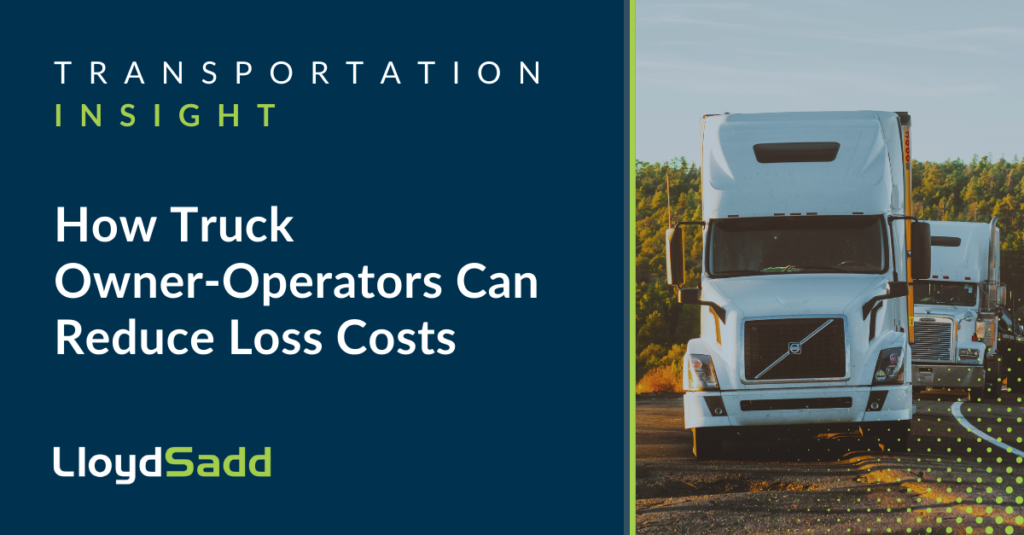How Truck Owner-Operators Can Reduce Loss Costs

Highway fatalities, soaring cargo thefts, attacks on drivers, blocked routes and commercial auto prices are through the roof. Combine these with driver injuries and skyrocketing health insurance and health care costs, and you can see why truckers are looking for relief.
Prove Yourself
Industry data show the most common causes of crashes are excessive speed, distracted driving and driver error under poor roadway conditions. The U.S. Federal Motor Carrier Safety Administration (FMCSA) has created a Compliance, Safety, Accountability (CSA) program to address and correct many of these issues.
The CSA program uses a rating system that numerically scores safety events and categorizes them for analysis:
- Unsafe driving
- Crash indicator
- Hours-of-service compliance
- Vehicle maintenance
- Controlled substances/alcohol
- Hazardous materials compliance
- Driver fitness
Data are collected through various means, including roadside inspections, crash reports and investigations.
Owner-operators with a higher score, signifying more violations, may be flagged for an intervention. Higher scores can also translate to higher insurance premiums because insurance companies can access the CSA system.
If you are a safe driver, you may wish to show off your good record. Telematics are widely available to monitor speed, hard braking, lane drifting and unsafe off-ramping. You can use these systems and provide your stellar performance data to your insurance broker to improve your risk profile.
Some digital record-keeping is mandated by law. In Canada, Transport Canada requires electronic logging devices (ELDs) to be used. An ELD syncs with the vehicle’s engine to automatically record driving time. Nearly every commercial truck operating in Canada must have an ELD installed.
In Canada, the ELD mandate went into effect on January 2023.
Educate Yourself
Safety training helps minimize liability and property losses. It will also help you avoid some of the worst health issues afflicting the industry. And it can save you thousands in out-of-pocket health and property costs, as well as lost income from downtime.
Learn about the effects of fatigue and lack of sleep, as well as other health-related concerns for drivers, such as diet and nutrition, exercise, ergonomics and smoking. Skyrocketing commercial auto premiums are in good company with health insurance rates and health care costs in general, so consider ways to reduce chronic medical conditions that come from lack of exercise, poor diet, low sleep quality and poor posture.
Your insurance broker may have access to ready-made wellness programs for truckers, so ask about the resources available.
You should also get smart about attacks on the road, like road rage and riots. Learn how to avoid assaults and how to escape them if necessary. You may need to consult your legal counsel and your insurance broker so you steer clear of problematic responses. You might be surprised what you can be held liable for!
Maintain Your Truck
A preventive maintenance program minimizes safety and financial risks. You should have a formal, written program and a log for your vehicle. The log should show when it was worked on, what was done, who did it and the next required service date. Regularly scheduled maintenance can detect minor issues before they cause an accident.
Here are some ways a maintenance program can benefit your business operations:
- Increased safety — When tires, brakes or engines are properly maintained, there are often fewer accidents.
- Increased productivity — Vehicles that are maintained are more reliable and have less unexpected downtimes due to breakdowns. As a result, there are fewer delays in shipment deliveries.
- Lower fuel costs — Maintenance items such as regular oil and fluid changes, engine tune-ups and tire pressure checks can make commercial trucks more fuel efficient.
- Better compliance — Regulators at the provincial and federal levels can impose penalties for vehicles that don’t comply with maintenance requirements.
Guard Your Cargo
There are ways to guard your cargo, from the time loading begins to the time it is fully offloaded at its destination:
- Take the keys. It seems pretty basic, but you should never leave your keys in the ignition of an unattended truck. This happens all the time at fuel stops and warehouses.
- Lock the doors. If you must leave your truck running while unattended (for climate or other reasons), lock the truck completely and carry a spare key.
- Secure all entry points. Thieves often enter rigs through windows. Even the little curb-view window on the passenger door is enough space for a thief to enter, so lock or block those access points.
- Don’t geotag. Though it is convenient and sometimes interesting to know what services or products are nearby, geotagging through social media apps allows would-be thieves to track and hit you at your most vulnerable locations.
- Install a tracking system. If your truck or trailer is stolen, a tracking system will increase the chances of recovery.
- Consider an alarm. Thieves generally don’t like to draw attention to themselves, so any motion-activated alarm system that makes a lot of noise can help deter criminals.
Insurance and Risk
All companies that operate at least one commercial truck must carry commercial truck insurance.
However, additional coverage is available to protect your business and personal assets from catastrophic loss. Insurance options include commercial general liability, cargo coverage, umbrella liability and physical damage. Additional specialty coverages include hazmat coverage and refrigerated truck (also known as reefer breakdown) coverage.
Make safety a top business practice and you will see financial rewards, from loss mitigation to a better insurance profile. You may end up saving money in multiple ways.
To download this insight, click here.